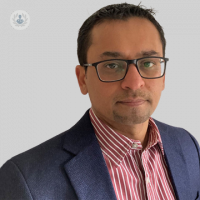Echocardiogram for children: A guide for parents on what to expect
Written by:In this informative guide for parents and guardians, revered consultant paediatric cardiologist and transplant physician Dr Abbas Khushnood shares key insight on what to expect from an echocardiogram for children.

What is an echocardiogram?
Echocardiogram (Echo) is a form of ultrasound scan. It is the most frequently used heart scan for diagnosing heart problems.
Different types of echocardiograms
Echocardiograms can be described in multiple categories. The most common echocardiography undertaken in children is called transthoracic echocardiogram, where images are taken by placing the ultrasound probe on the patient's chest. This can be performed in all children from birth to adults.
Another form of echocardiography is called transoesophageal echocardiogram, where images are taken by inserting the ultrasound probe into the patient's oesophagus or food pipe. This is more commonly used in adults under local anaesthesia and in children by putting them to sleep by giving general anaesthesia.
We also perform foetal echocardiograms, which are heart scans undertaken during pregnancy (antenatal scans). The ultrasound scan takes detailed pictures of the heart to see how it is developing and to look at the blood flow around it. In most cases, it is performed to check that the heart is developing normally and allows cardiologists to make a diagnosis of potential congenital heart disease before the birth of the baby. This helps in better counselling to parents and if a problem has been identified, this can be explained to parents along with all the options available, i.e. if your baby is likely to need medical and/or surgical treatment and when this is likely to be needed.
Other forms of echocardiography include advanced imaging e.g. 3D/4D echocardiography, stress echocardiography, advanced functional echocardiography.
What is the aim of an echocardiogram?
An echocardiogram (Echo) lets us evaluate the structure, function, and blood flow through the heart. It helps make the diagnosis of any structural abnormality within the heart, also known as congenital heart disease (as the child is born with such a heart defect) or issues with function of the heart (commonly related to weakness of heart muscle or cardiomyopathy).
How is an echocardiogram for a child performed?
Parents will be able to stay with your child throughout the scan. They will need to take off their t-shirt and lie on a bed next to the echo machine. The scan can last up to 45-60 minutes and your child will need to lie very still so good quality pictures can be taken.
The echocardiographer will put some gel on your child’s chest area and will then use a probe to send and receive ultrasound waves in order to make a picture. You and your child will be able to see the picture on a screen at the side of the bed.
Are there any risks?
The echo scan carries no risks, and is painless with no lasting effects. The gel used also causes no harm, although it can feel a little cold.
What happens after the scan?
The echocardiographer will give you some paper towels so that you can rub off the gel used in the scan. If your child is not having any further tests, you can then take them home. The echocardiographer will send a report about the scan’s results to your child’s doctor.
If you wish to schedule a consultation with Dr Khushnood, visit his Top Doctors profile today.


